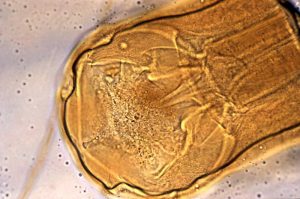Australian researchers have achieved ground-breaking results in a clinical trial using hookworms to reduce the symptoms of celiac disease.

Image/CDC
The results are also good news for sufferers of other inflammatory conditions such as asthma and Crohn’s disease.
In the small trial run over a year, 12 participants were each experimentally infected with 20 Necator americanus (hookworm) larvae.
They were then given gradually increasing doses of gluten – beginning with just one-tenth of a gram per day (the equivalent of a two-centimetre segment of spaghetti) and increasing in two further stages to a final daily dose of three grams (75 spaghetti straws).
“By the end of the trial, with worms onboard, the trial subjects were eating the equivalent of a medium-sized bowl of spaghetti, with no ill effects,” James Cook University (JCU) immunologist Paul Giacomin said.
“That’s a meal that would usually trigger a debilitating inflammatory response, leaving a coeliac patient suffering symptoms like diarrhoea, cramps and vomiting.”
Four participants withdrew in the earlier stages of the trial (for various reasons mostly unrelated to gluten) but the remaining eight experienced significant and ongoing benefits.
“The eight who stuck with the trial were able to increase their gluten tolerance by a factor of 60, a massive change,” said Alex Loukas, head of the Centre for Biodiscovery and Molecular Development of Therapeutics at JCU, and joint principal investigator of the study.
“We and others have had promising results in earlier trials but this is clear proof-of-principle of the benefits of hookworm in treating inflammatory disease,” Professor Loukas said.
Read the rest of the JCU release HERE
More on celiac disease HERE


I’m sold. How can I get myself infected with those hookworms? Seriously – I’m celiac and this sounds like a dream come true.